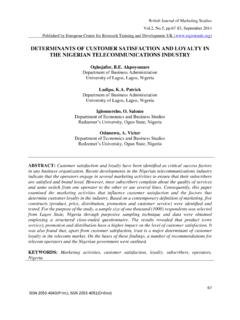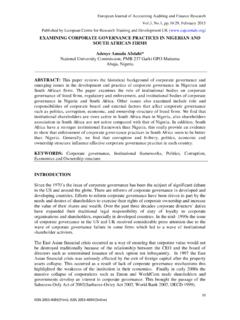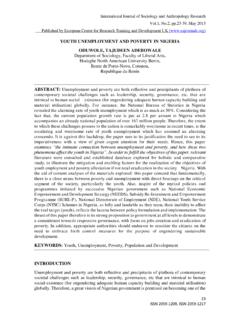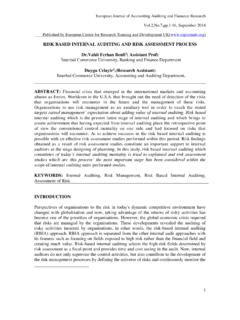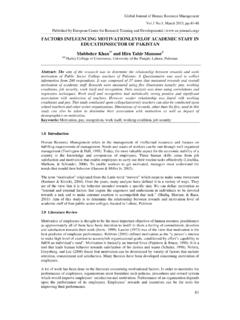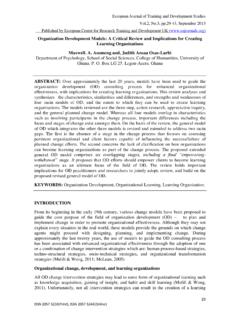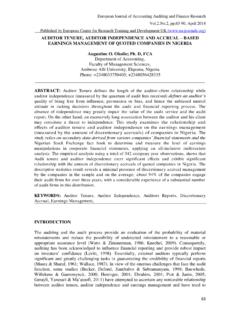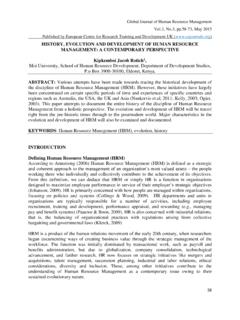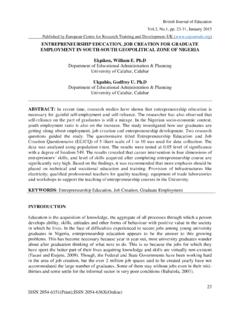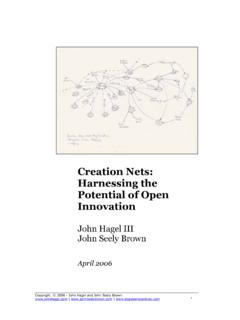Transcription of ENTREPRENEURIAL, TECHNICAL AND VOCATIONAL SKILLS …
1 British Journal of Education , , , October 2014. Published by European Centre for Research Training and Development UK ( ). entrepreneurial , TECHNICAL AND VOCATIONAL SKILLS REQUIRED. FOR SELF-RELIANCE AND JOB CREATION IN NIGERIA. UMUNADI, E. Kennedy TECHNICAL and Business Education, Delta State University, , Abraka ABSTRACT: This paper was set to examine entrepreneurial , TECHNICAL and VOCATIONAL SKILLS required for self-reliant and job creation. The relevance and appropriateness of the entrepreneurial , TECHNICAL and VOCATIONAL education curricula for preparing individual for the world of work is not reviewed on a regular basis.
2 Over the years as a result of industrial revolution, new machine, tools were manufactured for production in the company are now outdated. The industries are concerned about inadequate qualification of trained personnel and unemployable graduates that are roaming the street of the nation. Equally, educational institutions are reluctant to revise their curricula. They tend to stick to traditional and theoretical teaching, using outdated materials. Curricula of entrepreneurial , TECHNICAL and VOCATIONAL education review commissions are to look at the possibilities of identifying viable SKILLS and initiatives for the acquisition of SKILLS for self-reliant and job creation.
3 The paper pointed out inadequate infrastructure, issues of technology, teaching students theoretically and government interference as challenges that are hindrances to the promotion of skill required for self-reliance and job creation. It also addressed strategies for self-reliance required for SKILLS acquisition with some recommendations suggested that a combined curricula committee should be setup to x-ray the issues of SKILLS among others. KEYWORDS: entrepreneurial , Entrepreneur, TECHNICAL , VOCATIONAL , Self-Reliance And Job Creation INTRODUCTION. Entrepreneurship is a form of education commonly recognized by every society a job provider for the jobless and drop out of individual from our institution in Nigeria.
4 It is used as a strategy to solve social problems of unemployment, poverty, and unbalanced technological development. Entrepreneurship is the process of creating something new of value by devoting the necessary time and effort, assuming the accompanying financial psychic and personal satisfaction and independence (Hisrich and Peter, 2002). Ifeanacho and Ifeanacho (2014) cited Adegun and Akomolafe (2013) explained the concept of entrepreneurship development as a gradual growth of creative and economic and social venture. It involves setting up an individual to explore, opportunities successfully through making a profitable or suffering loss of invested capital.
5 The fundamental principle of entrepreneurship as a field of study is that it deals with the organization of knowledge in a particular subject in such a way that it commands more of the hidden potential in the subject in the area of self-employment and job creation. It has to do with system of ideas and values that are now given attention recently as part of the tertiary institution curriculum (Mkpa, 2014). The function of entrepreneurial studies at the school or faculty level in a conventional institutions is to enable its students to discover, whilst undertaking their regular course of studies, what other relevant work experiences other than those in paid employment of 48.
6 ISSN 2054-6351 (print), ISSN 2054-636X (online). British Journal of Education , , , October 2014. Published by European Centre for Research Training and Development UK ( ). government and other agencies are going on in society by the appropriate entrepreneurs so as to facilitate the direct exchange of information in the interest of students. The entrepreneurial and Entrepreneurship According to Caree and Thurik (2002) an entrepreneur is an enterprising individual who builds capital through risk and /or initiative. Entrepreneur in English dictionary is a term applied to a person who is willing to help, launch a new venture or enterprise and accept full responsibility for the outcome.
7 Over the time, scholars have defined the term in different ways. Here are some of their definitions. An entrepreneur is a person who pays a certain price for a product to resell it at an uncertain price, thereby making decisions about obtaining and using the resources while consequently admitting the risk of enterprise. An entrepreneur is an economic agent who units all means of production- land of one, the labour of another and the capital of yet another and thus produces a product. By selling the product in the market he pays rent or land, wages to labour, interest on capital and what remains is his profit, he shift economic resources out of an area of lower and into an area of higher productivity and greater yield.
8 The later definition is most appropriate when viewed from the perspective of economic development. Entrepreneurship is the practice of starting new organizations or revitalizing nature organizations, particularly new business generally in response to identified opportunities. An entrepreneur according to Butler (2012) is someone who creates a new organization by generating resources to take an idea to market by utilizing the entrepreneurial process. This involves an understanding of legal, fund raising and financial issues, marketing running the enterprise. Entrepreneurship is the act of identifying, initiating, organizing and bringing a vision to life, be it a new product, service, process, organizational strategy, promotional strategy or a niche market (Akinwumi, 2012).
9 Entrepreneurship creative force has spread across markets and industries, simultaneously creating new products and business models. Many high value entrepreneurial ventures seek venture capital in order to raise capital to build the business (Ugwuda, 2014). An entrepreneur with basic TECHNICAL education SKILLS can manage him/her self or set up his own business and become self employed and be able to employ other (FRN, 2004). The entrepreneur can establish a viable business enterprise and manage his entrepreneurial work efficiently as TECHNICAL and VOCATIONAL educator. This similarity of career goals of entrepreneurial , TECHNICAL and VOCATIONAL education had a meeting point statement of individual acquiring necessary skill to be self reliant in a chosen field in the National Policy on Education (FRN,2004): The trained manpower will be equipped with scientific, technological and business knowledge particularly at craft, advanced craft and at TECHNICAL levels.
10 TECHNICAL knowledge and VOCATIONAL SKILLS necessary for agricultural, commercial and economic development. Training and impart the necessary skill to individual who shall be self reliant economically The goals stated are all TECHNICAL education SKILLS required by an entrepreneur for survival as a business owner. Nonetheless, the importance of the subject in the world of business is such that most successful entrepreneurs are mostly TECHNICAL educators by training. Entrepreneurs with a sound knowledge of TECHNICAL education often perform better than their counterparts who are not proficient in the subject (Ugwuda, 2014).
